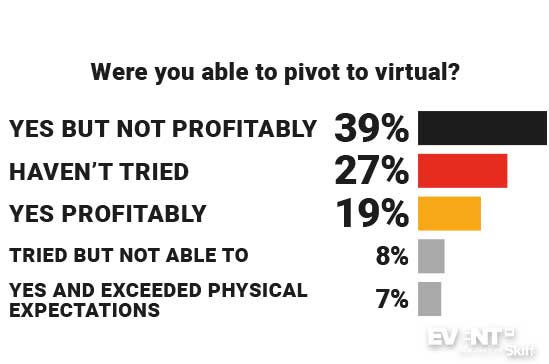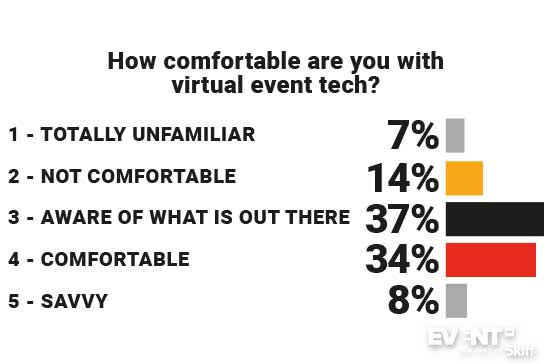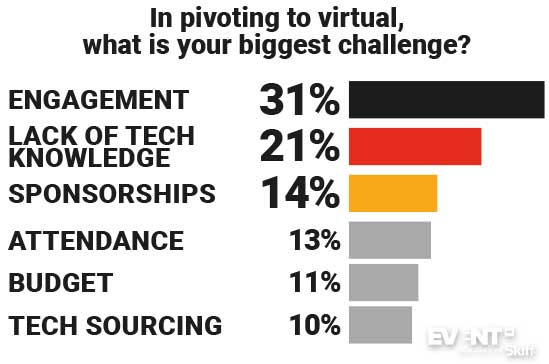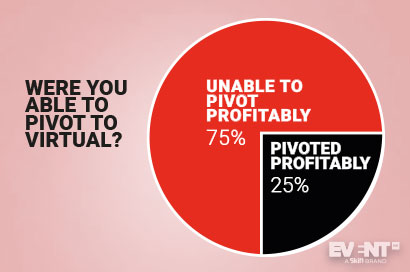While the event tech industry is answering the demand for virtual solutions by doubling down on their virtual and hybrid offerings, in the current environment, virtual events are simply not a viable way for many planners to make a profit.
Recent EventMB research found that 40% of eventprofs have not been able to successfully pivot to virtual, and of those who have, less than 40% were profitable. In addition, most planners (about 70%) said they expected to be able to recoup only 0-25% of this year’s revenue through virtual.
In general, these events require a particular skill set and robust tools, and much of the industry was not prepared for the drastic and sudden switch.

The Challenge of Virtual Events
Online events are difficult to monetize for a number of reasons. A poll during our Pivot to Virtual event indicated that only about a quarter of respondents were charging for them at all, and many are still unsure about whether and how to approach virtual event pricing.
Moreover, virtual events inherently require a certain degree of technical wherewithal. Many planners who are unfamiliar with the format have been struggling to master the skills required: Our research in the recently published Virtual Event Tech Guide found that less than 10% of planners consider themselves to be “savvy” when it comes to virtual event tech. In fact, about as many people ranked themselves at the lowest confidence level:

Many of these skills are transferable, and planners with a proclivity for embracing event tech have set themselves up for success. We recently spoke with Mike Burns from Aventri, which has been developing new virtual event technology, who mentioned that according to trends and feedback they’ve received, “those who had adopted a data-driven approach prior to the pandemic fared a lot better internally than those who didn’t. Event planners who had not been harnessing their data wound up with a lack of proof around event ROI when the pandemic hit.”
This was vital for planners to be able to prove the value of their events and the potential of virtual in order to avoid cancellations, but many were unfortunately not tracking data as much as they could have been.
Where Tech Is Still Lacking
Although virtual offerings by event tech companies have been skyrocketing, it’s clear that many eventprofs are still unsure about the options available to them — about 30% find the biggest challenges in pivoting to virtual are tech sourcing (10%) and a lack of tech knowledge (21%).

If unfamiliarity with the tools is one side of the coin, the other is unfamiliarity with planners’ priorities on the part of the suppliers.
The current offerings largely fall short when it comes to virtual event monetization — something that planners desperately need. While most providers offer sponsorship holdovers from event apps, like banner ads and exhibitor profiles, many have yet to figure out how to leverage core features of virtual events like live streaming. Less than half offer overlays on live streams (45%) or video interstitials prior to sessions (42%), and only about half offer videos or holding slides for breaks (51%).
More shockingly, almost a quarter of tech providers don't provide any specific analytics geared towards demonstrating sponsor ROI.
Many currently available tools (over 55%) also lack key monetization options such as providing gated on-demand content following the event. These types of features are extremely important to be able to organize a profitable virtual event, but their ubiquity in the available virtual event tech options does not reflect that.
IN CONCLUSION
Virtual events may be the only kind of events taking place in many areas of the world for the time being, but despite the industry rallying around them recently, they’re far from a perfect solution for everyone.
Eventprofs and tech platforms still have a ways to go when it comes to translating the value of live events to a virtual format and remaining profitable — but they’re only getting better, and mastering virtual will be crucial for success in the industry in the immediate future.





